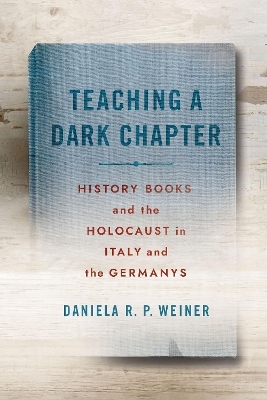
Teaching a Dark Chapter
History Books and the Holocaust in Italy and the Germanys
Seiten
2024
Cornell University Press (Verlag)
978-1-5017-7543-7 (ISBN)
Cornell University Press (Verlag)
978-1-5017-7543-7 (ISBN)
Teaching a Dark Chapter explores how textbook narratives about the Fascist/Nazi past in Italy, East Germany, and West Germany followed relatively calm, undisturbed paths of little change until isolated "flashpoints" catalyzed the educational infrastructure into periods of rapid transformation. Though these flashpoints varied among Italy and the Germanys, they all roughly conformed to a chronological scheme and permanently changed how each "dark past" was represented.
Historians have often neglected textbooks as sources in their engagement with the reconstruction of postfascist states and the development of postwar memory culture. But as Teaching a Dark Chapter demonstrates, textbooks yield new insights and suggest a new chronology of the changes in postwar memory culture that other sources overlook. Employing a methodological and temporal rethinking of the narratives surrounding the development of European Holocaust memory, Daniela R. P. Weiner reveals how, long before 1968, textbooks in these three countries served as important tools to influence public memory about Nazi/Fascist atrocities.
As Fascism had been spread through education, then education must play a key role in undoing the damage. Thus, to repair and shape postwar societies, textbooks became an avenue to inculcate youths with desirable democratic and socialist values. Teaching a Dark Chapter weds the historical study of public memory with the educational study of textbooks to ask how and why the textbooks were created, what they said, and how they affected the society around them.
Historians have often neglected textbooks as sources in their engagement with the reconstruction of postfascist states and the development of postwar memory culture. But as Teaching a Dark Chapter demonstrates, textbooks yield new insights and suggest a new chronology of the changes in postwar memory culture that other sources overlook. Employing a methodological and temporal rethinking of the narratives surrounding the development of European Holocaust memory, Daniela R. P. Weiner reveals how, long before 1968, textbooks in these three countries served as important tools to influence public memory about Nazi/Fascist atrocities.
As Fascism had been spread through education, then education must play a key role in undoing the damage. Thus, to repair and shape postwar societies, textbooks became an avenue to inculcate youths with desirable democratic and socialist values. Teaching a Dark Chapter weds the historical study of public memory with the educational study of textbooks to ask how and why the textbooks were created, what they said, and how they affected the society around them.
Daniela Weiner is a Lecturer in Civic, Liberal, and Global Education at Stanford University. She has published in Journal of Modern Jewish Studies, Journal of Educational Media, Memory, and Society, and Journal of Contemporary History.
| Erscheinungsdatum | 03.06.2024 |
|---|---|
| Zusatzinfo | 5 Halftones, black and white |
| Verlagsort | Ithaca |
| Sprache | englisch |
| Maße | 152 x 229 mm |
| Gewicht | 907 g |
| Themenwelt | Geschichte ► Allgemeine Geschichte ► 1918 bis 1945 |
| Geisteswissenschaften ► Geschichte ► Regional- / Ländergeschichte | |
| Geschichte ► Teilgebiete der Geschichte ► Militärgeschichte | |
| Sozialwissenschaften ► Pädagogik ► Allgemeines / Lexika | |
| ISBN-10 | 1-5017-7543-X / 150177543X |
| ISBN-13 | 978-1-5017-7543-7 / 9781501775437 |
| Zustand | Neuware |
| Haben Sie eine Frage zum Produkt? |
Mehr entdecken
aus dem Bereich
aus dem Bereich
ein Psychologe erlebt das Konzentrationslager
Buch | Hardcover (2024)
Kösel (Verlag)
22,00 €
Mythos „Stauffenberg-Attentat“ – wie der 20. Juli 1944 verklärt und …
Buch | Hardcover (2024)
Goldmann (Verlag)
24,00 €


